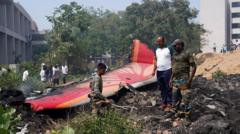Regulatory authorities in India and South Korea have initiated widespread inspections of fuel control switches on Boeing planes this week, prompted by troubling new insights from the recent Air India crash that claimed several lives. Additionally, Singapore Airlines and its budget offshoot, Scoot, reported that they have completed similar inspections for their Boeing fleets.
This week, a preliminary assessment released by Indian investigators concerning the crash of Flight 171 in June indicated that the plane's fuel supply had been cut shortly after takeoff. While the investigation has yet to determine final conclusions regarding the cause—narrowing the focus primarily to the aircraft's fuel switches—it has notably ruled out mechanical failures or design flaws.
Investigators stated that both fuel control switches on the Boeing 787 aircraft were reportedly switched off just moments after the flight commenced. Each switch features a locking mechanism intended to prevent accidental adjustments, suggesting that human interference is the most plausible cause of the switches' movement.
The investigation references a 2018 advisory issued by the Federal Aviation Administration (FAA), which urged operators of various Boeing models, including the 787, to inspect the functionality of these locking mechanisms. However, the preliminary report revealed that Air India had not performed the recommended inspections, as compliance was not mandatory. The FAA had previously assessed that the concerns regarding the locking feature did not constitute a significant safety risk.





















